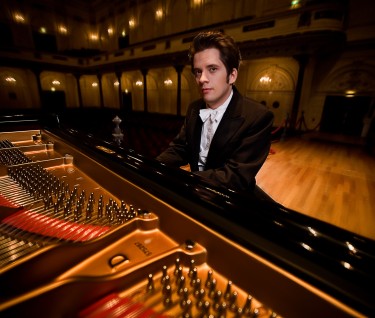Eckardstein opens Piano Festival with power and poetry
 Severin von Eckardstein returned to open the Miami International Piano Festival’s Discovery Series Thursday night at the Lincoln Theatre, two years after his successful local debut under the same auspices.
Severin von Eckardstein returned to open the Miami International Piano Festival’s Discovery Series Thursday night at the Lincoln Theatre, two years after his successful local debut under the same auspices.
This young German pianist, winner at the Queen Elisabeth of Belgium Competition and recipient of numerous awards, provided much pleasure with a challenging and intellectually stimulating program to open the weekend festival in fine style.
In his 2007 appearance, Eckardstein’s playing was superlative in execution, yet seemed a bit cool emotionally. Two years later the pianist has grown as a performer. While he remains an undemonstrative presence, interpretively his patrician reserve appears to have vanished, and the music poured forth without affectation or, seemingly, much effort.
His group of three Chopin Nocturnes was as delicate and stormy as one could wish. He uses rubato freely, and is not afraid of bringing the volume level down to a whisper. This was Chopin playing at its best, with just the right amount of lyrical sentiment and emotional control.
Eckardstein’s performance of Scriabin’s perfumed and seductive Op. 32 Poems and the Poeme-Nocturne of Op. 61 showed masterly use of pedal and an ability to color the textures to a remarkable degree. The eroticism of Scriabin’s all-too-brief Fourth Sonata shows the Russian composer reaching his mature style. Dating from 1903, it is both languid and sensuous, Scriabin even writing a fanciful poem that describes it as a flight to a distant star. Eckardstein’s journey was full of detail, performed with a wild but controlled fantasy that richly conveyed Scriabin’s world with a sense of ease and wonderment.
The Ballade in G minor by Edvard Grieg is a substantial work that is rarely encountered in the recital hall. It has all of the composer’s familiar characteristics, including the Norwegian folk element, and passages of splashy virtuosity. At nearly twenty minutes, it is Grieg’s most ambitious work for solo piano with all of the composer’s imagination being utilized in fourteen variations.
Imagination was also the key element of Eckardstein’s performance. The technical passages were incorporated into the structure of the music with a beguiling array of Grieg’s rich harmonies and palette of colors.
Unlike the Grieg, Messiaen’s Regard de l’Eglise d’amour seemed to go on for an eternity with pseudo-religiosity in ample supply. This concluding section from the French composer’s Vingt regards sur L’Enfant-Jesus was brilliantly and enthusiastically played, yet between the crashing chords and birdlike twitter, the music seemed empty, pompous and totally banal.
Closing with Liszt’s monumental Sonata in B minor brought us once again into the world of the sublime. This epic work was composed years after Liszt had given up his career as a virtuoso and reflects the composer’s more spiritual elements. Although still fiercely difficult, it shies away from empty display and turns its back on the Hungarian’s stock-in-trade glitter meant only to dazzle.
Eckardstein brought a strong musicality, structural grasp, and concentrated power to the intensely demanding sonata. Following an almost inevitable standing ovation, several encores were played until the house lights were turned up.
The Miami International Piano Festival continues Friday with Stephen Beus performing music of Bach, Barber, Liszt, Mendelssohn and Medtner 8 p.m. at the Lincoln Theatre. www.miamipianofest.com; 877-722-2924.
Posted in Performances
Leave a Comment
Fri May 15, 2009
at 11:20 am
No Comments